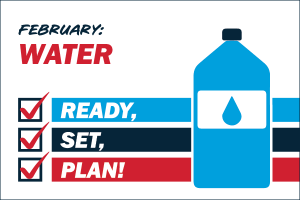February: Water
 Whether you rely on municipal or well water, your water supply relies on electricity to run the system. During a power outage you may find yourself without a way to get water. Your water supply can also become unsafe to drink. Both private wells and city water systems can be contaminated in a disaster.
Whether you rely on municipal or well water, your water supply relies on electricity to run the system. During a power outage you may find yourself without a way to get water. Your water supply can also become unsafe to drink. Both private wells and city water systems can be contaminated in a disaster.
Goal
Have enough water on hand to last three days (72 hours). This should be about three gallons per person.
Take Action
Have a 72-hour supply of commercially bottled water.
To be prepared for an emergency, it’s a good idea to stock up on water in the event the supply is disrupted. General health guidance suggests one gallon of water per day, per person. It’s also suggested to always be prepared for at least three days, meaning you should have at least three gallons of water on hand. This can be accomplished with three gallon-sized jugs or a case of 24 standard 16.9 ounce bottles. You may not typically purchase bottled waters, but your safety and health in an emergency are critical. Store your water in a cool, dark place to keep it fresher longer.
Off-Campus Students
Have three gallon-sized jugs or a case of 24 standard 16.9 ounce bottles on hand. Additionally, if warnings about water supply impacts are advised, such as a storm predicted to cause heavy flooding, fill bathtubs and sinks with water prior to the weather event. This water can be used for multiple purposes, like flushing toilets, bathing, cooking (if you have a clean tub) and other uses.
On-Campus Students
It is rare that water service is affected on campus. However, it can occur, often without notice. It would be a good idea to have a case of 24 water bottles on hand for you and your roommate should water service be suspended.
